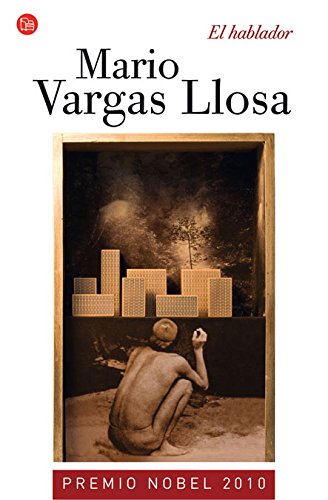
12 Best Spanish Novels for Advanced Learners
Reading Spanish novels for advanced learners is a great way to continue pushing yourself toward fluency.
You’ll improve your comprehension, learn some advanced vocabulary and engage your mind in a new way.
These 12 Spanish novels contemplate philosophy, morality and other deep topics that will get you thinking (hopefully in Spanish).
Allow yourself to get lost in the story and you won’t even realize how much you’re learning along the way!
Contents
- 1. “La vida es sueño” by Pedro Calderón de la Barca
- 2. “Oráculo manual y arte de prudencia” by Baltasar Gracián
- 3. “El hablador” by Mario Vargas Llosa
- 4. “Niebla” by Miguel de Unamuno
- 5. “La celestina” by Fernando de Rojas
- 6. “El amor en los tiempos de cólera” by Gabriel García Márquez
- 7. “Cien años de soledad” by Gabriel García Márquez
- 8. “Crónica de una muerte anunciada” by Gabriel Garcia Marquez
- 9. “La vida de Lazarillo de Tormes” by Anonymous
- 10. “Don Quijote de la Mancha” by Miguel de Cervantes Saavedra
- 11. “Nada” by Carmen Laforet
- 12. “El tiempo entre costuras” by Maria Duenas
- And One More Thing…
Download: This blog post is available as a convenient and portable PDF that you can take anywhere. Click here to get a copy. (Download)
1. “La vida es sueño” by Pedro Calderón de la Barca
First published in 1635, “La vida es sueño” (Life Is a Dream) is a philosophical Spanish-language play about human existence and the meaning of life. It explores themes such as free will, fate and the relationship between father and son.
This book is an excellent choice for Spanish language learners as it’s available in a dual language format with the English translation facing the Spanish original. This can help you understand the sometimes obscure vocabulary and Spanish idioms.
A classic from Spain’s Golden Age, it provides cultural insight and historical context. Despite its depth, the play’s brevity makes it accessible for learners just entering the advanced level.
2. “Oráculo manual y arte de prudencia” by Baltasar Gracián
With the English title “The Art of Worldly Wisdom,” this Spanish novel was written in 1647 with a collection of 300 maxims (and commentary) providing guidance on how to live fully and be the best person you can be.
The style of this book is considered a prime example of Conceptismo (conceptism), a style in Spanish literature characterized by its candor, fast-paced rhythm, simple vocabulary, wordplay and witty metaphors.
This is an excellent choice for advanced learners looking for a fun and inspiring read. The simple vocabulary makes it easy to understand, while its wordplay and metaphors provide a challenge that goes beyond the language of everyday conversation.
3. “El hablador” by Mario Vargas Llosa
First published in 1987, “El hablador” (The Storyteller) takes place in Peru in the early 1950’s. The plot follows a university student who leaves civilization and joins an indigenous tribe, but finds it difficult to leave his ingrained Western mindset behind.
The novel alternates between two narrators, the main character and the storyteller of the Machiguenga tribe. It explores the effect of globalism and the loss of indigenous cultures, questioning the judgment of such cultures as primitive.
This is a great choice for advanced Spanish learners due to its erudite language and blend of tribal mythology, providing both a cultural and literary experience. It also provides an interesting perspective of life in indigenous Peru.
4. “Niebla” by Miguel de Unamuno
“Niebla” (Mist) is a “nivola” (neither novel nor novella) written in 1907. It’s fairly abstract and has an existentialist feel, perfect for the philosophically inclined.
Soon after proposing to a woman he loves, Augusto finds out she’s leaving him for another man. He contemplates suicide but consults Unamuno (the author) first, who tells him he’s a fictional character and thus cannot kill himself.
The majority of this book is dialogue so it’s great for Spanish learners. After you finish it, you can watch the movie (in Spanish) and see the dialogue come to life on the screen.
5. “La celestina” by Fernando de Rojas
“La celestina” was first published in 1499 and is considered one of the greatest works of Spanish literature. The novel is written entirely in dialogue and can be read as a play.
Filled with proverbs written in Old Spanish vernacular, this is a challenging and thought-provoking read. There are annotated editions available specifically for Spanish learning that include the meaning and usage of certain words and phrases.
This book marks both the end of the Middle Ages and the beginning of the Renaissance. Though not the most philosophical of the list, it contains elements of emerging capitalism, prostitution, classism, romance, tragedy, egoism and the supernatural.
6. “El amor en los tiempos de cólera” by Gabriel García Márquez
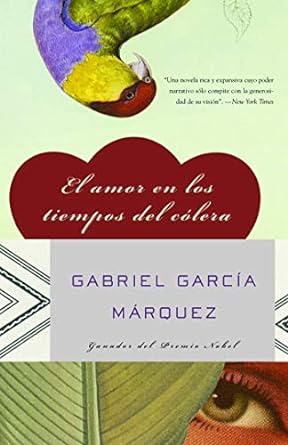
“El amor en los tiempos de cólera” (Love in the Time of Cholera) is a timeless exploration of love, patience and the human spirit. Set in a Caribbean town, it unfolds the epic tale of Florentino Ariza’s unyielding love for Fermina Daza, even as she marries another.
Márquez masterfully weaves a narrative spanning over half a century, navigating the complexities of relationships and societal expectations. Against the backdrop of a cholera epidemic, the characters grapple with the passage of time and the endurance of true love.
Márquez’s magical realism infuses the novel with poetic prose, offering a captivating journey into the intricacies of the heart and the enduring power of love.
7. “Cien años de soledad” by Gabriel García Márquez
“Cien años de soledad” (100 Years of Solitude) is perhaps the most popular choice of novel for the advanced Spanish learner. Written in 1967, this classic has been translated into 37 different languages.
The plot follows the lives of one family for seven generations. It blends the mundane with the supernatural, plays with the concepts of linear and cyclical time and contrasts fate with free will.
This can be a daunting read even for native speakers, so it’s a real challenge for Spanish learners. With its advanced vocabulary, nuanced literary style and complex metaphors, this novel is sure to provide a stimulating learning experience.
8. “Crónica de una muerte anunciada” by Gabriel Garcia Marquez

“Crónica de una muerte anunciada” (Chronicle of a Death Foretold) is another great read from Gabriel Garcia Marquez, published in 1981. It’s slightly shorter and a bit simpler than the previous two, so it might be a good option to start with.
The story revolves around a man who returns to the town where Santiago Vassar was killed 27 years prior, determined to uncover the truth. He finds that the townspeople knew of the murderers’ intentions, but no one tried to stop them.
The captivating narrative combines magical realism with a detective story, using the real facts of a famous crime in Colombia.
9. “La vida de Lazarillo de Tormes” by Anonymous
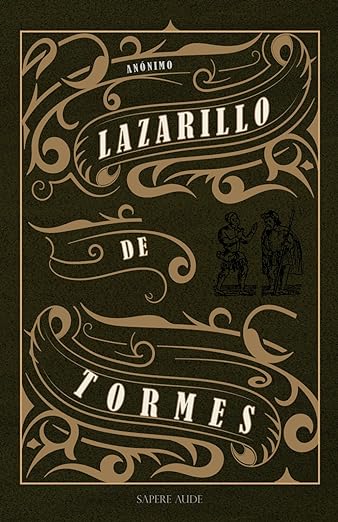
“La vida de Lazarillo de Tormes” (The Life of Lazarillo de Tormes) is a seminal work of Spanish literature that was published anonymously in 1554. Considered the first picaresque novel, it offers a satirical portrayal of the socio-economic conditions of 16th-century Spain.
The novel recounts the life of Lazarillo, a resourceful and cunning young boy born into poverty. Serving various masters, Lazarillo provides a critical commentary on the hypocrisy and corruption of the time through a series of episodic adventures.
The novel’s innovative narrative style and social critique have secured its place as a foundational piece in the literary canon. Being centuries old and containing some satire, it’s a good challenge for advanced learners.
10. “Don Quijote de la Mancha” by Miguel de Cervantes Saavedra
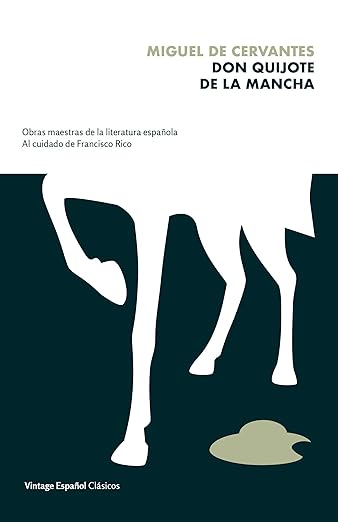
First published in 1605, “Don Quijote de la Mancha” (“Don Quixote” in English) stands as a cornerstone of Western literature. Many different versions have been released, including a youth edition for less confident Spanish readers.
Often hailed as the first modern European novel, the story follows the delusional yet idealistic Alonso Quijano, who, inspired by chivalric tales, transforms into the self-styled knight Don Quijote. Accompanied by his loyal squire Sancho Panza, he embarks on absurd adventures.
Cervantes skillfully weaves humor, satire and profound reflections on reality and illusion. Beyond its entertaining narrative, the work explores the nature of literature, perception and the enduring power of imagination, making it an enduring classic.
11. “Nada” by Carmen Laforet
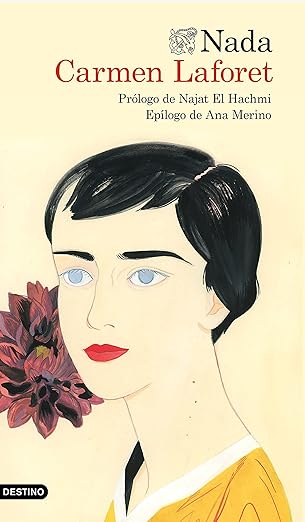
Published in 1944, “Nada” (Nothing) has become a Spanish classic and has won several awards. It will give you a look into post-Civil War Spain and the difficulties of that time.
Andrea moves to Barcelona to study literature soon after the end of the war. She moves in with her grandmother, but the state of the apartment as well as the tension and violence around her clouds her excitement for her fresh start in the city.
This is a great novel for improving your reading comprehension and learning a bit about Spanish culture and an important time in the country’s history.
12. “El tiempo entre costuras” by Maria Duenas

Published in 2009, “El tiempo entre costuras” (The Time In Between) is the most recent novel on the list. It follows the life of Sira Quiroga, a young dressmaker from Madrid who follows her new lover to Morocco right before the start of the Spanish Civil War.
When her lover abandons her, she uses her gift of making beautiful clothes to create a new life rather than return to her homeland where violence and instability are emerging.
This New York Times bestseller has been translated into 40 languages and inspired a TV series often called the “Spanish Downton Abbey.”
These Spanish novels for advanced learners are sure to stimulate your mind and improve your language skills!
If you’re looking to increase your skills in Spanish both in reading and listening, you might try supplementing your learning with online Spanish classes or language learning apps.
FluentU is one app that helps you link the words you read to their pronunciation and meaning using Spanish videos.
FluentU takes authentic videos—like music videos, movie trailers, news and inspiring talks—and turns them into personalized language learning lessons.
You can try FluentU for free for 2 weeks. Check out the website or download the iOS app or Android app.
P.S. Click here to take advantage of our current sale! (Expires at the end of this month.)

However you take your Spanish to that next level of fluency, you’ll learn best if you’re motivated to keep going. So choose a Spanish novel that appeals to you and try to read a bit every day!
Download: This blog post is available as a convenient and portable PDF that you can take anywhere. Click here to get a copy. (Download)
And One More Thing…
If you've made it this far that means you probably enjoy learning Spanish with engaging material and will then love FluentU.
Other sites use scripted content. FluentU uses a natural approach that helps you ease into the Spanish language and culture over time. You’ll learn Spanish as it’s actually spoken by real people.
FluentU has a wide variety of videos, as you can see here:

FluentU brings native videos within reach with interactive transcripts. You can tap on any word to look it up instantly. Every definition has examples that have been written to help you understand how the word is used. If you see an interesting word you don’t know, you can add it to a vocab list.

Review a complete interactive transcript under the Dialogue tab, and find words and phrases listed under Vocab.

Learn all the vocabulary in any video with FluentU’s robust learning engine. Swipe left or right to see more examples of the word you’re on.

The best part is that FluentU keeps track of the vocabulary that you’re learning, and gives you extra practice with difficult words. It'll even remind you when it’s time to review what you’ve learned. Every learner has a truly personalized experience, even if they’re learning with the same video.
Start using the FluentU website on your computer or tablet or, better yet, download the FluentU app from the iTunes or Google Play store. Click here to take advantage of our current sale! (Expires at the end of this month.)


